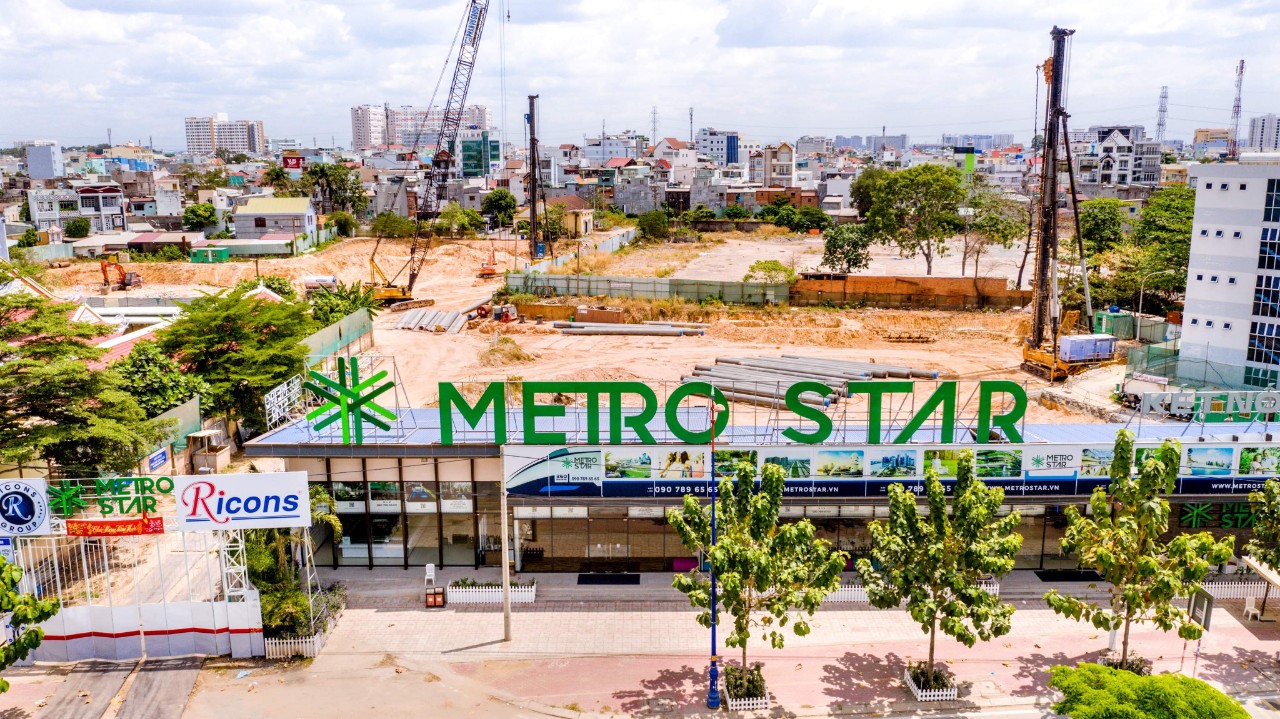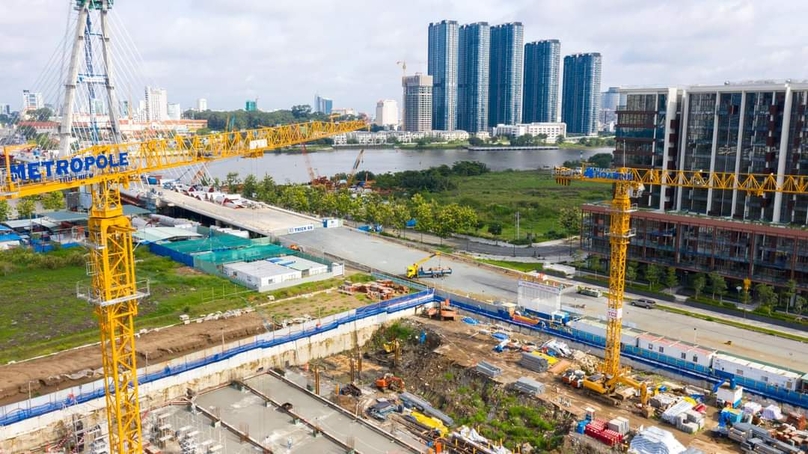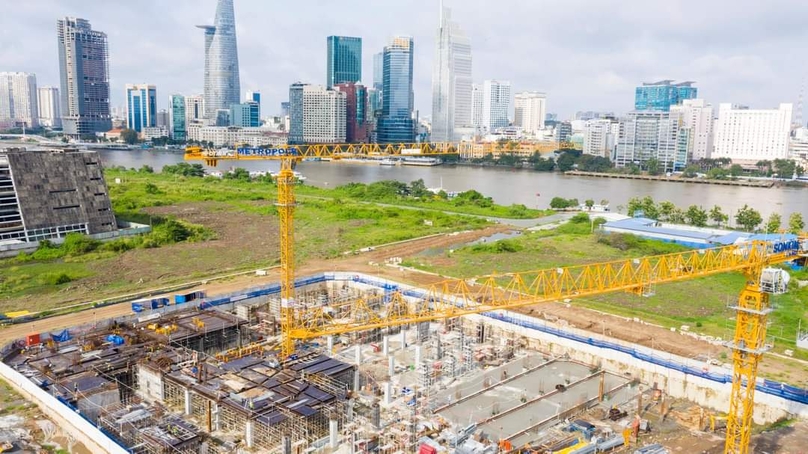
Tragedy strikes real estate salespeople, businesses
The gloomy real estate market has driven many real estate businesses to dispair, with large developers like Novaland, Danh Khoi, Van Phuc, and Nam Group laying off employees, owing wages of up to three months, or even making quarterly wage payments.

In the first 10 months of 2022, nearly 2,300 enterprises suspended their operations, up 52.8% year-on-year. Photo courtesy of The Investor/Gia Huy.
Sudden layoffs
In early September, a week after her company, one of the largest real estate developers in Ho Chi Minh City, announced it would cut 40% of personnel due to difficulties, Vo Thuy Ha, deputy chief of the marketing division, received information that she was among those laid off this time.
Holding the notice in hand, the 29-year-old girl did not believe this fact because she boasted seven years of experience in this field and had made great contributions to the company. More sadly, she was diagnosed with cancer over a year ago and is under treatment. Her monthly salary was just enough to cover her chemotherapy and medicines.
"In the layoff announcement, the corporation gave us three options: continue working without pay, continue working and receive part of your wage, or leave the job until the business situation improves,” she said.
“However, now I suffer serious illness and need money for treatment and living, so I cannot choose any of the solutions offered by the company. Since October, I have applied for jobs everywhere, but no firm has accepted my application because all of them are reducing personnel and not recruiting new employees. Next week I will return to my hometown and apply for a job after the Lunar New Year (Tet) holiday," Ha revealed.
In the same situation, Nguyen Van Tuan, a salesman of Danh Khoi Group, has just been fired. He said he and his wife are real estate salespeople. His wife worked for a brokerage company in District 1, but in September the company announced it would close down because it had not sold any products for four months.
Danh Khoi Group, where Tuan worked, has not paid any staff wages for three months. And the group’s leadership has announced a personnel reduction of tens of percent.
"We are both from other provinces and work in HCMC to earn a living. In 2019, we bought an apartment in the form of installment purchase. Each month, we have to pay nearly VND20 million ($8,050) to the bank. My wife is about to give birth. Now both of us have lost our jobs, and don't know how to manage our life in the near future, especially with Tet approaching," Tuan said.
Luckier than Ha and Tuan, Pham Hong Tien, sales manager of Hai Ha Real Estate Joint Stock Company in Ho Chi Minh City, has no other choice but to agree with her company’s 40%-reduction and quarterly-paid wage solution.
"In previous years, on average, we sold hundreds of products every month. But since the beginning of 2022, tightened credit and bad rumors about the real estate market have made customers hesitant about putting down money. The company could not sell its products, meaning no revenues. Therefore, it had no money to pay staff wages," said Tien.
According to Nguyen Huong, general director of Dai Phuc Land Real Estate JSC, a member of Van Phuc Group, since October the group had cut 10% of its staff, mainly those in charge of construction supervision.
Van Phuc has been known as a strong group thanks to its small bank loans, large sales and high inventories. However, since the 2022 outset, its sales have been very low, leading to personnel cuts.
2,300 brokerage firms suspended in 10 months
Ha Thanh Real Estate JSC, with Le Tuan Vo as CEO, had around 300 employees at a time when the real estate market was thriving. But from 2021 to date, the company has struggled to maintain operations and had to lay off employees.
"In 2021, despite the impact of the pandemic, the company could manage to operate as there were still transactions. But 2022 is really a difficult year for us. We had only seven transactions in eight months while we still had to pay office rent, wages for employees, electricity and water bills, at about VND1 billion ($40,254) per month. I could not manage to withstand losses, so in October I decided to temporarily close the company," said Vo.
Nguyen Van Hau, CEO of Asian Holding Real Estate JSC, said that his business has seen only few successful transactions over the past months. Every month he suffers a loss of more than VND1 billion ($40,300) toward wages and other expenses.
A recent report on the real estate market situation by the Finance-Economics-Real Estate Institute of Dat Xanh Services (FERI) revealed “startling" facts and figures. In the 10 months of 2022, nearly 2,300 enterprises suspended their operations, a year-on-year increase of 52.8%. Those completing dissolution procedures approximated 1,000, up 42% over the same period last year. Many firms had to restructure their business models, scale down operations, and cut personnel.
No transactions have led to a sharp decrease in revenue among brokerage firms. In addition, they still have to spend money running ads and covering expenses.

Some developers have offered discounts of up to 45-50% to ride out their liquidity crisis. Photo by The Investor/Gia Huy.
Trading land to survive
Amid a myriad of difficulties, in order to survive, many business owners have become “traders” to earn money to pay staff.
The story of My Le, CEO of MULand Real Estate JSC, is an example. Since 2021, the brokerage firm has struggled to sell products while costs toward wages and operations grew too large.
To survive, Le said she turned to trading land. She went to HCMC’s neighboring provinces to buy land lots and then sell them to other investors, or acted as a land broker to take commissions and use them to cover monthly expenses. "Trading is difficult, but this is the best solution for me to help my company survive the current difficulty," she said.
Doing the same, Luu Thi Thanh Mau, CEO of Phuc Khang Corp, said that she had changed her model in 2021, closing the brokerage business, and only focusing on project investment. She also bought land lots and projects in provinces and then sold to them other investors. Profits taken from this activity are used to feed employees and help the company surf current difficulties.
Leaders of many real estate businesses in southern Vietnam said they are trying to find ways to help their companies overcome current difficulties. For example, instead of selling incomplete houses, Tran Anh Group decided to equip houses with an interior so that buyers could move in right away. In addition, furniture makers are paid in real estate products instead of cash. This way helps the firm deal with inventories and diversify products.
Meanwhile, Nova Group and Hung Thinh Corporation have offered discounts of up to 45-50% if home buyers pay 95% of the product value right after the purchase contract is signed.
In particular, many businesses have decided to sell their land funds to get money to maintain their operations. For example, Phat Dat Real Estate Development Corp is offering for sale a large land bank in Ba Ria-Vung Tau province, which neighbors HCMC.
Ha Van Thien, deputy general director of Tran Anh Group, said that in the current context, the state needs to accelerate the amendment of related laws to put them in place soon, creating a legal corridor and transparent environment for real estate activities.
It is necessary to create conditions for businesses to develop, thus helping recover the market in a positive manner, he said, adding that authorities should remove legal obstacles to project implementation and develop open mechanisms in this field.
In addition, Thien proposed carrying out social housing development policies to balance supply and prices; and developing solutions to expand and diversify capital sources for the market.




